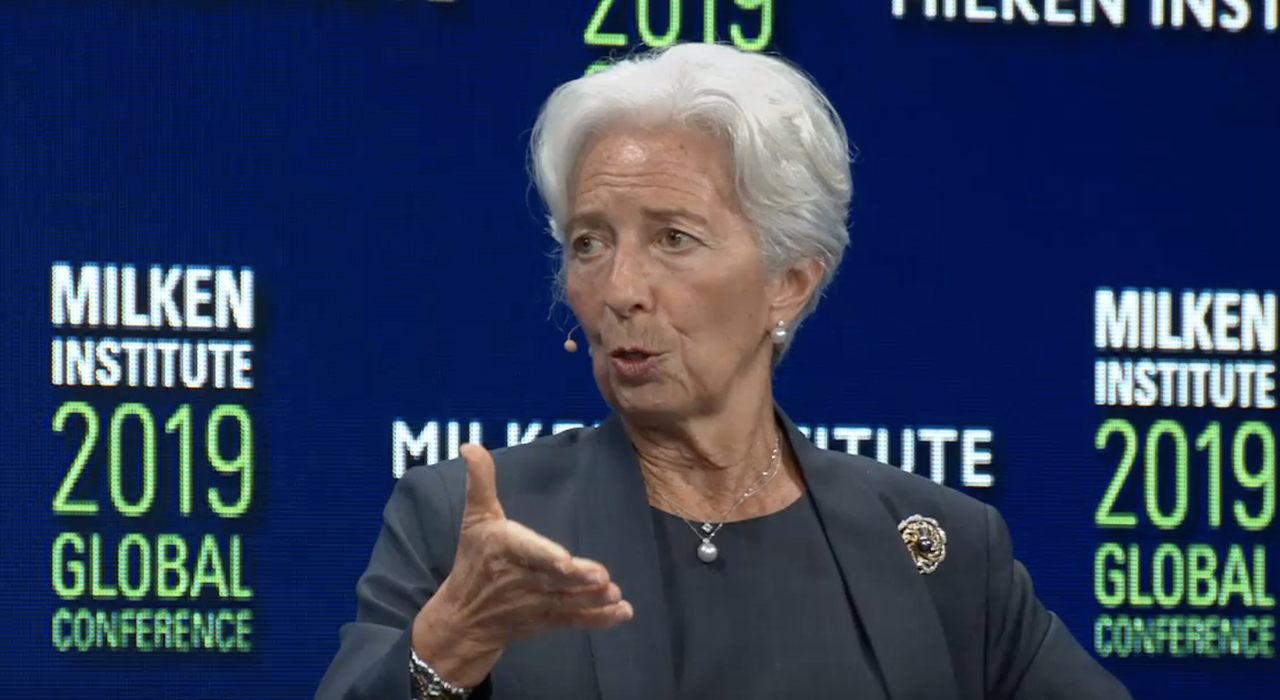Without skipping a beat, IMF Director Christine Lagarde left President Xi’s Belt and Road initiative conference and traveled to sunny southern California to make an appearance at the Milken Institute Conference, where she sat for an interview with former WSJ editor-in-chief (now editor-at-large) Gerry Baker.
Given that Friday’s surprisingly robust (at least on the surface) GDP print has revived speculation among some economists about ‘divergence’ between the US and the global economy, Baker led with a question about whether Q1 GDP had impacted the view on US growth over at the IMF.
While the surprisingly large number will “certainly lead us to reassess our forecast for growth in the US,” which could in turn boost the global economy, Lagarde cautioned that one strong GDP print doesn’t make a trend, and that the global economy remains mired in what she called a “delicate moment.”
Earlier this month, the IMF again slashed its forecasts for global growth, this time to its weakest level in a decade.
Asked if we’re seeing more divergence now.
“We still think that it’s a delicate moment given the still synchronized slowdown for growth…you have about 70% of the global economy which is slowing – but still growing – and we are not expecting a recession and certainly not in our baseline. Everybody including the highest authorities were certainly surprised by the large number in the United States…that will certainly lead us to reassess our forecast for growth for the United States, and clearly given the size of the US economy it will have an impact overall.”
Looking ahead, the upcoming reading on US productivity will be important.
“First quarter big jump in inventory number we’re not seeing consumption going up and we’re not seeing big investment either…productivity will be important…odds are that it will be good and that’s important because we’ve been waiting for productivity to be good.”
Asked about persistently below target inflation, and whether the Fed may have jumped the gun by hiking rates last year, Lagarde said that inflation (or rather, the lack thereof) was “a mystery” and that if she had the answer she would be “queen of the economy” – to which Baker replied that she already holds that title as head of the IMF?.
“It’s highly mysterious…and if I had the answer I’d be the ‘queen of the economy.’ It’s a big of a mystery because the famous Philips curve should lead inflation up given where we are with unemployment.”
She added that the inflation conundrum wasn’t unique to the US; Germany has experienced a similar phenomenon. But central banks weren’t wrong to raise rates, Lagarde said, citing their ‘mandate’ to maintain stable prices (though of course they also have another implicit and even more important mandate to ensure the continued growth of asset prices).
“I wouldn’t say that they got it wrong. They have a mandate. The mandate is price stability and the number that has been set for decades now has been at or below 2%.”
Indeed, although “everybody” would like a little more inflation (and by ‘everybody’, we assume Lagarde means a handful of economists, because most working people are already struggling to process the inflation in health-care costs, tuition, rent and other necessities that have hammered the standard of living in the developed world), Lagarde pushed back against those who have been pushing to change the central bank’s target rate.
“I’ll tell you what I find quite extraordinary with this theory…if you can’t get it up to 2% why would setting it at 4% get it up? Everybody would like a little more inflation but I don’t think setting a higher bar would necessarily trigger higher inflation. It’s going to be a matter of supply and demand…and the economy responding to those places.”
On the subject of China and, more specifically, Xi’s promise to adopt more sustainable lending standards, Lagarde insisted that she believes the Chinese will follow through.”
Toward the end of the interview, Baker asked Lagarde for her thoughts about the theory that the global economy is entering a period of permanent stagnation, what he called ‘Japanification’. Lagarde said she’s not surprised by this as populations across most of the world are shrinking. And while she couldn’t say whether she believes this is phenomenon will persist for years or decades, she did say that higher productivity growth could help boost growth once again.
“I think relationships are going to be difference…and I don’t know if it will be a fundamental shift, but it’s one that’s factoring the ageing phenomenon that’s impacting most of the world except Sub-Saharan Africa. What could take us out of that changing landscape is productivity. We might be measuring productivity in a skewed way that’s no longer relevant.”
Finally, Baker asked Lagarde for her thoughts about the rising tide of socialist fervor in the US, and the warnings from Ray Dalio, Jamie Dimon and other prominent capitalists that our unsustainable system must be ‘fixed’ or risk falling apart.
“I don’t think that globalization is going to go away…I don’t think that it can continue with the level of inequality we have around the world and if those issues of inequality aren’t addressed at multiple levels – both in terms of opportunity in terms of focus on the excluded in terms of the desire of people to have their roots and culture preserved…for women to be part of the game at all levels of society…then the system is going to be under threat on a continuous basis.”
While she said she appreciates Jamie Dimon and Ray Dalio speaking out, the world needs to own this problem. And actions speak louder than words.
Being half-way through her second term, Baker closed by asking her if she would consider another term once this one ends in 2021.
“Maybe,” she replied. “I’m keeping my options open – just like the Brits.”
WSJ editor-at-large Gerry Baker’s interview with Christine Lagarde begins around the 15 minute mark.
via ZeroHedge News http://bit.ly/2VtGFfu Tyler Durden
